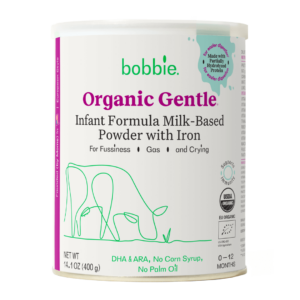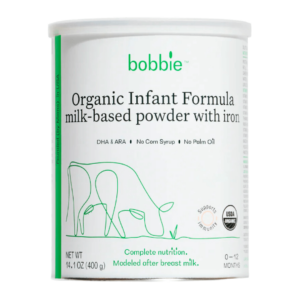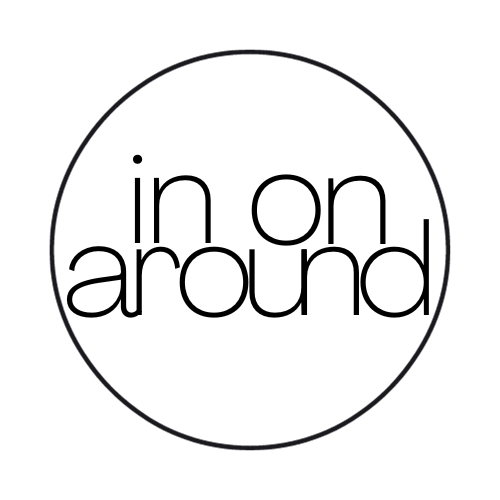If you’re looking to give your baby some formula, there are important things that you must know. Not all formulas are created equal. What are the best non-toxic baby formula options? Are there heavy metals in baby formula? Does organic infant formula matter? Is toxic baby formula being sold?! How does it compare to breastfeeding?
Keep reading to learn more about healthier baby formula options.
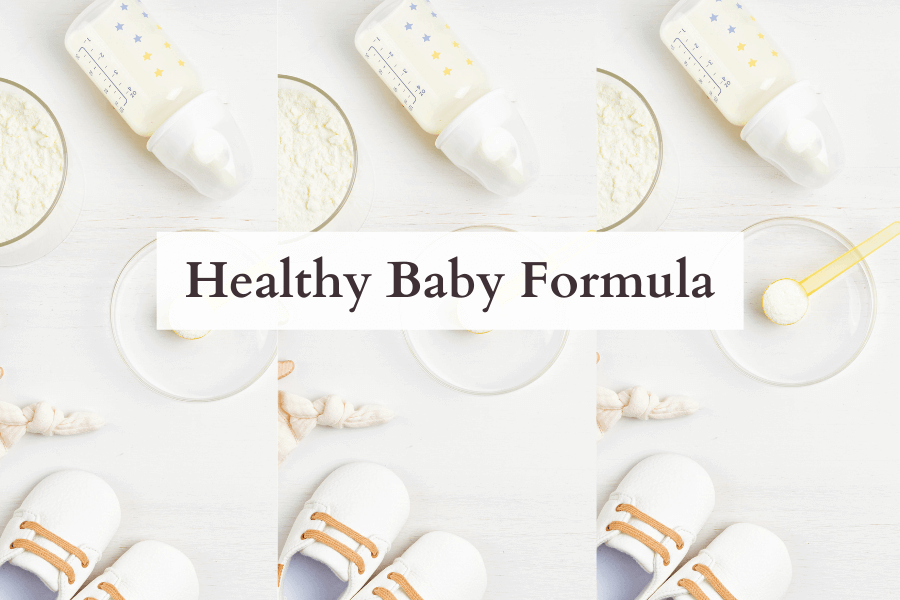
Note: This article contains affiliate links, meaning In On Around will make a small commission at no additional cost to you. This helps me maintain the site. As always, I value full transparency & only work with brands I love and trust.
Disclaimer: Work directly with your pediatrician. None of this information should be taken as medical advice.
What Is Baby Formula?
Proper nutrition is absolutely essential for the baby’s body and brain! Baby formula provides an infant with important fat, protein, carbohydrates, vitamins, and minerals if they cannot drink breastmilk. It’s manufactured to try to mimic natural human milk to help the baby grow.
It can be used either as a supplement to breastmilk or as the sole source of nutrition for the baby.
This, however, can come with risks. Let’s dive into all the details!
There are over 50+ baby formula brands available in the United States.
The Different Types Of Baby Formula
Cow’s milk formula is the most common type of formula. Some babies can be intolerant to the proteins in cow’s milk. There are also hypoallergenic formula options available, where the cow’s milk protein is broken down (partially hydrolyzed). Note: Cow’s milk formula must be specially formulized for infant consumption, otherwise it will have too much sodium and protein. Breast milk contains about 60% whey protein and 40% casein protein, while cow’s milk contains about 20% whey and 80% casein. [1]
Goat’s milk formula is becoming increasingly more popular since it’s more similar to breastmilk. However, babies who are extremely sensitive to dairy (like with a milk allergy) will likely still be allergic to goat’s milk.
Formula will always be inferior to breastmilk.
Soy milk formula is a vegan option, which should be avoided at all costs unless the baby cannot handle any dairy. It is very different than natural milk. These formulas can also have higher levels of dangerous heavy metals, like arsenic, cadmium, and lead. [2] They oftentimes contain corn syrup or other forms of carbohydrates.
Some baby formulas are also sold in stages, meaning they are tailored for a specific age range (like 0-6 months, 6 months-older, 1 year or older, etc…). This is great since nutritional needs can change over the course of development!
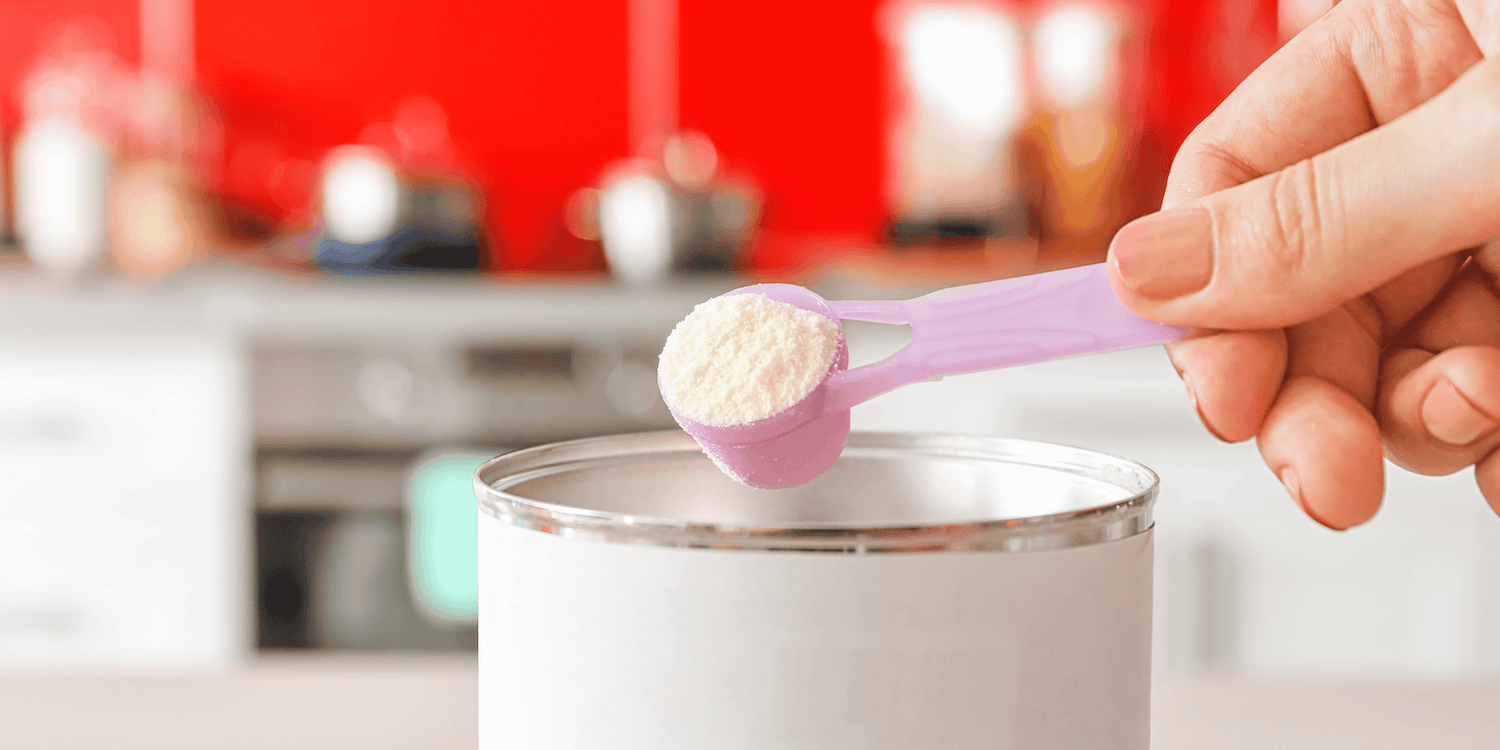
Breast Feeding vs. Formula
Both breastfeeding and formula supply hydration, energy, and important nutrients to the baby, however, they should not be considered equivalent. Both colostrum and regular breastmilk are extremely nutritious. Breastmilk is amazing for a baby’s immune system, growth, and proper development.
Breastmilk contains long-chain polyunsaturated fatty acids (like DHA or Omega-3 and ARA or Omega-6), which are important fats for vision. It’s the best food for babies – the way nature intended. The perfect food!
Breast milk is best.
Breast milk is usually…
- Easier to digest for most babies (the nutrients are better absorbed)
- Contains immune-boosting compounds and protective antibodies
- Better for helping your baby fight off diseases and infections
- A great bonding experience for mother & child
- Full of prebiotics to support gut health and nucleotides for a healthy sleep pattern
- Complete with over 1,000+ proteins
It’s MORE than just a source of nutrition for a baby – it can impact their long-term health.
Breastfed babies have a lower incidence of disease, diarrhea, and respiratory tract illness. [3, 4, 5] It also can help prevent childhood allergies, skin conditions like eczema, and cognitive issues. [6, 7]
Breastfeeding babies cuts the risk of sudden infant death syndrome (SIDS) by HALF! [8] Breastmilk can also help prevent obesity, diabetes, teeth issues, and certain cancers (like leukemia) in the child. [9, 10, 11, 12]
The health benefits don’t stop there. Women who breastfeed are also more likely to lose their baby weight faster, and are less at risk for breast cancer, ovarian cancer, and diabetes. [13] Wow.
On average, breastfed babies get sick less often.
Experts recommend that breastfeeding should take place exclusively for at least six months. Once a formula is incorporated, breast milk supply can begin drying up and it may be difficult for a baby to latch. Once breastfeeding has stopped, it can be difficult to go back. Keep this in mind!
Exclusive or predominant breastfeeding for babies under 1 month of age reduces the hospitalization rate by two-fold. [14]
How To Increase Breast Milk Supply
About 75% of new moms start off by breastfeeding, however, that number dwindles over time.
Of course, breastfeeding doesn’t always go to plan. The most important thing is to make sure your baby is receiving enough nutrition and is properly hydrated. If your doctor recommends incorporating formula, it’s best to do so.
As always, do your due diligence as well, it doesn’t hurt to get a second opinion. Unfortunately, some pediatricians are not well-versed in nutrition and herbal medicine.
Work with a qualified naturopathic doctor to determine why you may be struggling with breastfeeding.
NOTE: This information is not intended to shame mothers who choose to use formula. It’s all about being a conscious and informed consumer to make the best choice for your baby.
That being said, there are some ways to increase the amount of milk you’re producing:
- Breastfeed 8-12 times a day, when your baby is hungry. [15]
- Pump any extra milk between breastfeeding sessions
- Work with a lactation consultant
- Keep stress levels at bay
- Incorporate certain lactation-stimulating herbs/veggies, like fenugreek and fennel (but talk to your doc)
- Use both breasts during each feeding! [16]
- Quit smoking and drinking alcohol
- Massage your breasts
- Steer clear of any breast augmentations (unless medically necessary) and piercings
- Use a safer form of birth control instead of hormonal contraceptive pills
- Get your baby checked for tongue or lip ties
- Make sure you’re getting enough rest
- Stay well hydrated!
- Talk to your doctor about any medications you’re taking, which may impact feedings
Work with your qualified naturopathic doctor, lactation consultant, or primary care physician to discuss any issues you may be having with breastfeeding.
Most women make 33% more breast milk than needed at each feeding (which is a good thing)! Low supply may not be the issue.
What Ingredients Are Commonly In Infant Formula?
Now let’s dive into formulas. There are many ingredients in baby formula (both good and bad):
- Pesticides, like glyphosate
- You can read more about glyphosate here: Is There Glyphosate In Organic Food? Glyphosate 101
- Genetically modified corn and soy
- Genetically modified sugar from corn syrup, brown rice syrup, maltodextrin
- Growth hormones
- Heavy metals (like arsenic)
- Inflammatory vegetable oils (like palm oil, soybean or sunflower oil)
- Palm oil may be linked to a decrease in calcium absorption (hence a worsened bone mineralization or bone density). [17]
- Fatty acids, usually derived from fish oil
- Vitamins (many are synthetic)
- Probiotics (in select formulas only)
- Fillers, like carrageenan
- Nano-particles (like “needle-like” nano hydroxyapatite or nano HA)
- Synthetic ARA and DHA (which can be processed with hexane, a very harsh chemical)
Many dairy-free formulas also incorporate rice. It’s best for infants to avoid rice due to potentially high levels of arsenic (a dangerous heavy metal).
Is Baby Formula Regulated?
Yes, baby formula is regulated by the Food and Drug Administration (FDA). All baby formula must meet FDA requirements in order to be sold. They require that 29 essential nutrients must be in the formula.
However, the FDA does not approve infant formulas before they are marketed and many believe the FDA standards are far too lax. This is yet another reason why it’s incredibly essential to do your own due diligence.
European Baby Formula vs. American
More and more families are deciding to opt for European-manufactured or European-inspired baby formulas… and for good reason! Although European formulas are not FDA-approved, they do usually meet the FDA’s nutritional standard for infant formula and can have higher-quality ingredients.
The EU bans certain toxic sugars, like corn syrup, from milk-based formulas (which is great)! They require that about 30% of the carbohydrates should come from lactose, which is important for energy (this is not a requirement in USA-based brands). They ban any synthetic nutrients that are extracted with chemical solvents. European formulas can also come in other milk forms, like goat’s milk.
European organic standards are also more strict than American standards, especially regarding farm transparency. Some are even Demeter or Bioland certified, meaning the cows were raised humanely and exceeded traditional organic standards!
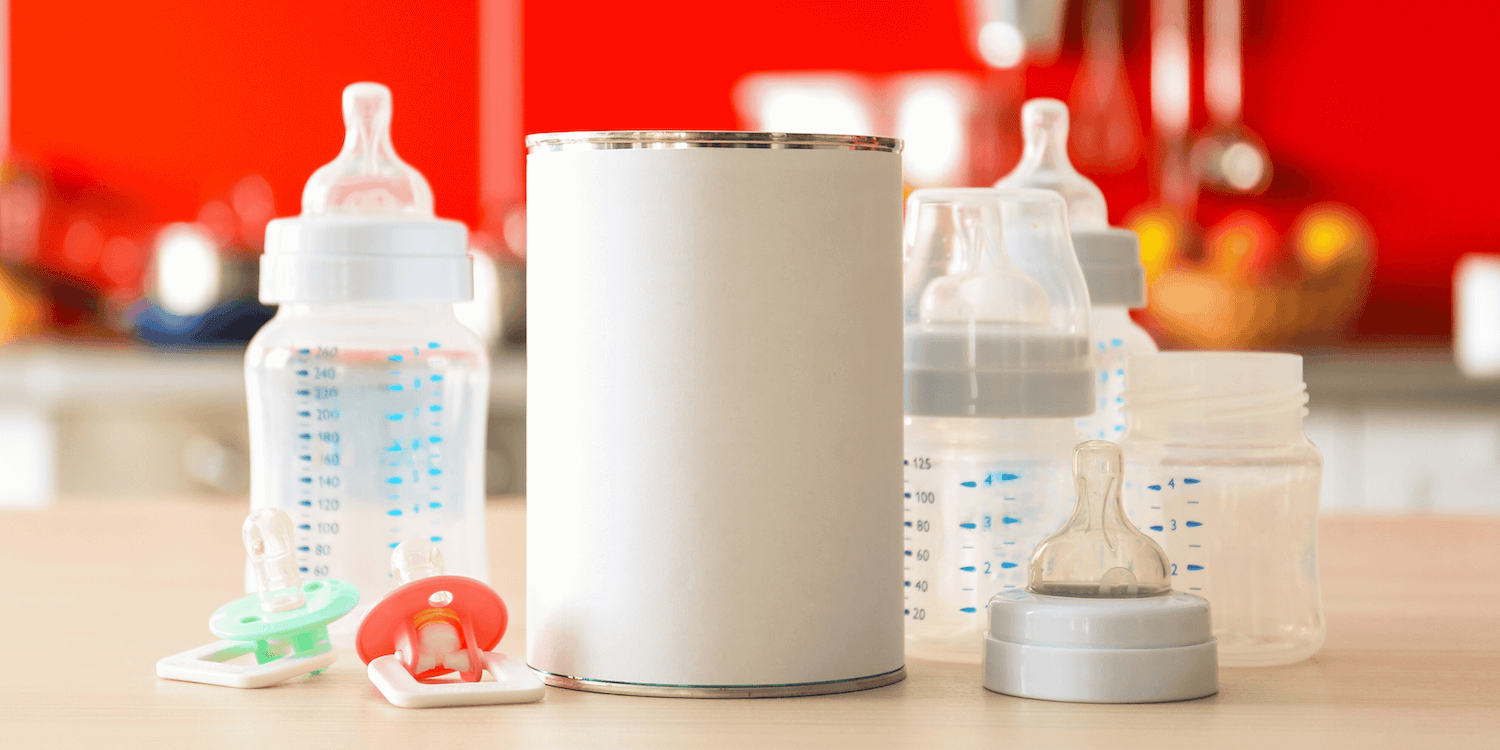
European Formula Issues To Be Aware Of
- Technically, it’s illegal to important European baby formulas for commercial purposes, so they can be hard to get your hands on.
- You may run into translation issues, especially with measuring (since many of these imported formulas can be written in a different language or in different units of measurement).
- You won’t know how the product was imported and if it was within safe temperatures.
- European formulas oftentimes have less iron than USA-based brands, but higher DHA.
Are There Heavy Metals In Baby Formula?
Heavy metals are naturally occurring in the environment, like in the soil and in rock. Most baby formulas will likely have some level of heavy metals in the product – it’s inevitable.
22% of tested baby formulas exceeded Prop 65 levels for lead and cadmium (the two most prominent heavy metals found in baby formula). [18] This includes organic options! This is why it is incredibly important to support infant formula brands that use high-quality ingredients and safety measures.
Are There Pesticides In Baby Formula?
Yes, there can be pesticide residues found in baby formula, especially if they are not organically grown. Europe requires that all infant formulas must have no detectable levels of pesticide residues. Most pesticide residues in baby formula can actually come from the water used during the mixing process.
It is of utmost importance to use a very high-quality water purifier to remove any contaminants. Make sure to properly sterilize or boil the water according to the instructions on your formula. Using unfiltered water can potentially expose your baby to unnecessary toxins.
To read more about my favorite water purifiers, check out this article: AquaTru vs. Berkey – What To Look For In A Water Filter or Purifier
Homemade Baby Formula – Is It Safe?
Homemade baby formula is not always safe. When made incorrectly, it can seriously injure your baby, leading to rickets, anemia, seizures, brain damage, hospitalization, or more. Oftentimes it can have an incorrect level of certain vitamins and minerals, such as calcium.
Some homemade milk recipes also encourage raw milk, which can be especially dangerous for babies since they’re at a higher risk of contracting food-borne illnesses, like E. Coli.
There are better alternatives to homemade baby formula, such as pre-made formula or donor milk. While this is not always realistic, unless it’s a dire short-term emergency, avoid homemade baby formula when possible.
Questions To Ask When Looking For Formula
There are a lot of factors when considering the best formula for your lifestyle.
- Is this product organic?
- Does it include probiotics or prebiotics?
- Does it include corn syrup or corn syrup solids, especially towards the top of the ingredient list?
- What kind of oil is used?
- How expensive is this formula?
- Can I buy this in stores or only online?
- Is this product from Europe?
- How well does your baby tolerate these formulas? Do they experience any unwanted side effects?
Healthier Baby Formula Brands:
First and foremost, when looking for a healthier baby formula brand, it must be organic. This means that it’s free of synthetic pesticides, nanomaterials, synthetic preservatives, artificial colorants, growth hormones, genetically modified organisms (GMOs), and more. At least 95% of the ingredients in a certified organic baby formula must be organic.
NOTE: No one baby formula is “perfect,” unlike breastmilk. I haven’t found a single “non-toxic baby formula” without at least 1 or more questionable ingredients. Many contain some form of potentially inflammatory vegetable oils; however, these are oftentimes necessary for the composition of the product.
Best “Natural” Formulas
- Bobbie – My favorite!
- The only USA formula that sources milk from organic & pasture-raised cattle. It’s European-style inspired.
- Contains sunflower oil
- Loulouka [Update Jan 2023: Loulouka is no longer manufacturing, but it’s still available on some shelves]
- Contains sunflower oil and rapeseed oil (canola oil)
- Jovie Goat Milk Formula
- Glyphosate-residue free
- Contains sunflower oil
Update October 2023: I recently came across a new start-up called Leche, which transforms breast milk from liquid into powder. I can’t attest to the quality of their manufacturing process since I haven’t tested it myself, but it can be an interesting option! Check them out.
Better “Natural” Formulas
Many of these contain palm oil or maltodextrin, which can be more difficult to digest or acts as a sweetener.
- Topfer
- Contains organic maltodextrin
- Contains palm oil, sunflower oil, and canola oil
- By Heart
- USA-based, but not USDA-certified organic (it’s a new formula, but the major ingredients are organic)
- Contains sunflower oil and rapeseed (canola oil)
- Kendamil Organic
- May not be a sufficient source of iron
- Uses full-fat milk
- Contains sunflower oil and rapeseed oil (canola oil)
- Make sure you’re opting for the organic version. They sell both conventional and organic options.
- Holle
- May not be a sufficient source of iron
- Contains organic maltodextrin (a sweetener and thickener), but they’re Demeter certified
- Contains palm oil, sunflower oil, and canola oil
- HiPP Organic
- May not be a sufficient source of iron
- Contains palm oil, sunflower oil, and rapeseed oil (canola oil)
- Can contain emulsifiers in some versions
- Lebenswert
- May not be a sufficient source of iron
- Bioland certified
- Contains palm oil, sunflower oil, and rapeseed oil (canola oil)
- Serenity kids (for children 1+ in age)
- Contains palm oil
- USA-based, but not USDA-certified organic
Worst “Natural” Formulas
Most of these either contain: corn syrup solids, brown rice syrup, are not organic, or are owned by multi-national conglomerates. Only you can decide if supporting food conglomerates is an issue for you.
This section includes most conventional baby formulas (Enfamil, Similac, Gerber, Well Beginnings, Perrigo, Parent’s Choice…).
- Truth Organic
- Contains corn syrup solids
- Contains sunflower oil and canola oil
- Contains maltodextrin
- Owned by The Kroger Co.
- Baby’s Only Toddler Formula
- Some versions contain brown rice syrup (USA-based)
- Some versions contain maltodextrin
- No prebiotics, probiotics, or Omega-6 fatty acids
If You Prefer Smaller Companies, Avoid These Options:
- Bimbosan Organic Stage 1
- Contains sunflower oil and rapeseed oil (canola oil)
- Owned by Swiss-company Hochdorf
- Pure Bliss
- NOT organic (don’t be fooled by the “non-GMO” label)
- Owned by Similac (Abbott Laboratories)
- Earth’s Best
- Contains palm oil and sunflower oil, which can be inflammatory
- Sold baby food with toxic heavy metals
- Owned by conglomerate Hain Celestial Group
- Burt’s Bee’s Baby
- Contains palm oil, soy oil, and sunflower oil
- Owned by conglomerate Clorox – Proctor & Gamble
- Happy Baby Organic
- Contains a lot of maltodextrin and glucose syrup solids (sugar) – depends on the formula
- Contains palm oil, soy oil, and sunflower oil
- Owned by conglomerate Danone
- Similac Organic
- Lack of ingredient transparency on website
- Contains maltodextrin and sugar
- Owned by Abbott Laboratories
- Kabrita Goat Milk Toddler (for children 1+ in age)
- Not organic
- Contains palm oil and sunflower oil
- Owned by Dutch-company Ausnutria
Do NOT fall for the “#1 most recommended formula by pediatricians” claims.
Donor Milk – Pros & Cons
While breastfeeding is best for the baby’s health, it can be very, very hard on the body. Mastitis, bleeding, blisters, pain – it can be a struggle for many women (not to mention the immense amount of time it takes). If you don’t want to use formula, there are other options!
Check out the following resources and tips for donor breastmilk:
- Check out local breastmilk banks through the Human Milk Banking Association of North America.
- Search for Human Milk For Human Babies Facebook groups. This can help you find breastmilk donors in your state.
- Look for donor milk from women who do not drink alcohol, smoke, take medication, or have infectious diseases of any kind.
- To find more non-toxic baby products, check out the In On Around Shop (see the baby category).
Baby Formula – In Summary
Mommas – you are amazing. Whether you choose the breast or the bottle, keep your baby’s nutrition a top priority. If you opt for baby formula, look for the healthiest options within your budget.
We are all bio-individual – certain babies may have issues with one brand, while another baby may not. I hope this information helps you make a confident decision on the safest baby formula options.
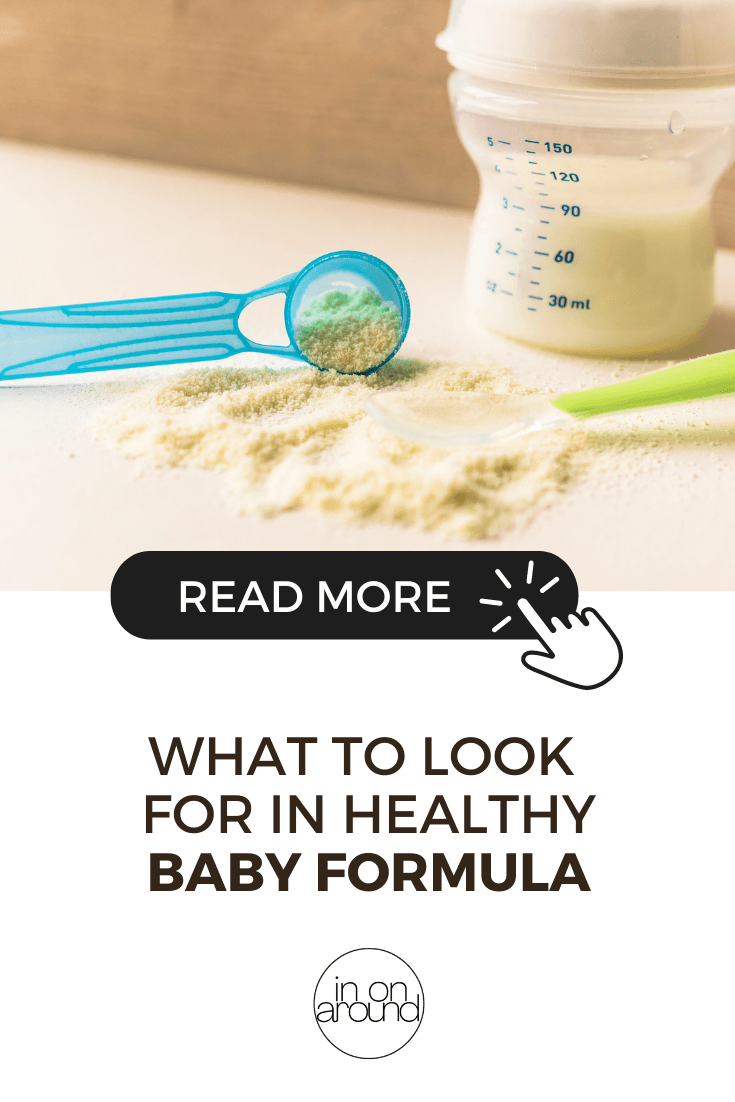
Frequently Asked Questions
Click on the below FAQs to learn more about safer non-toxic baby formula options!
What Is Baby Formula?
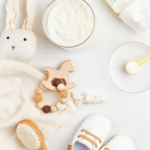
Baby formula provides an infant with important fat, protein, carbohydrates, vitamins, and minerals if they cannot drink breastmilk. It’s manufactured to try to mimic natural human milk to help the baby grow. It can be used either as a supplement to breastmilk or as the sole source of nutrition for the baby.
Why Is Breastfeeding Healthy For A Baby?

Breastmilk is easier to digest for most babies (the nutrients are better absorbed). It contains immune-boosting compounds and protective antibodies. Breastmilk is better for helping your baby fight off diseases and infections. It’s also a great bonding experience for mother & child. Breastmilk is full of prebiotics to support gut health and nucleotides for a healthy sleep pattern.
What Should I Look For In Baby Formula?

When looking for a healthier baby formula brand, it must be organic. This means that it’s free of synthetic pesticides, synthetic preservatives, artificial colorants, growth hormones, genetically modified organisms (GMOs), and more. At least 95% of the ingredients in a certified organic baby formula must be organic.
What Are The Healthiest Baby Formula Brands?
Do you opt for a non-toxic baby formula?
Let me know your thoughts in the comments below!
You can watch our web story here.
xoxo,

Want to read more? Check out my other articles here!
Information on non-toxic baby formula from: Hopkins, New York Times, Mayo Clinic, Medela, CDC, Healthline, LA Lactation, American Pregnancy, Baby Formula Experts, Nature’s One, Better Goods, Little Bundle, Organics Best, Mommyhood 101, Parents, WRIC, Bubble And Bee, U.S. House of Representatives, FDA, Primoris, Friends Of The Earth, Center For Food Safety, Mamavation
Copyright In On Around LLC 2022 ©. The statements made on this website have not been evaluated by the FDA (U.S. Food & Drug Administration). They are not intended to diagnose, treat, cure, or prevent any disease. The information provided by this website should not be used as individual medical advice and you should always consult your doctor for individual recommendations and treatment. The information contained in this site is provided on an “as is” basis. Related to this site, there are no guarantees of completeness, accuracy, usefulness, or timeliness. In On Around LLC assumes no responsibility or liability for any errors or omissions in the content of this site.

